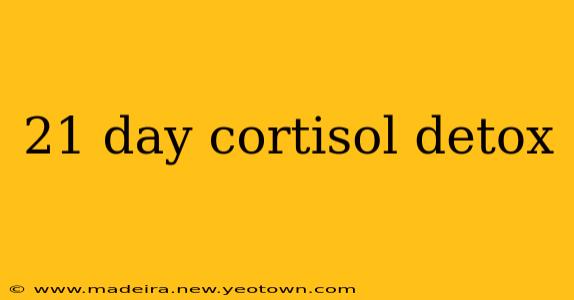21-Day Cortisol Detox: A Journey to Balance
Life in the fast lane. We all know it. Deadlines looming, to-do lists a mile long, and the constant hum of notifications vying for our attention. This relentless pressure takes a toll, often manifesting as that insidious hormone imbalance: high cortisol. But what if I told you there's a path to reclaiming your equilibrium, a pathway to a calmer, more centered you? This 21-day cortisol detox isn't about drastic measures; it's a gentle guide towards sustainable change, a journey toward hormonal harmony.
This isn't a quick fix; it's a lifestyle shift. Think of it as a reset button, gently guiding your body back to its natural rhythm. We'll explore strategies to manage stress, optimize sleep, and nourish your body with the nutrients it craves to naturally lower cortisol levels. This isn't about eliminating cortisol entirely—it's crucial for survival—but about restoring balance.
What is Cortisol and Why is Detoxing Important?
Cortisol, often called the "stress hormone," is essential. It regulates blood sugar, blood pressure, and even your immune response. However, chronically elevated cortisol levels due to prolonged stress can wreak havoc, leading to weight gain, sleep disturbances, anxiety, depression, and a weakened immune system. This 21-day plan aims to address the root causes of elevated cortisol, not just the symptoms.
What are the symptoms of high cortisol?
This is a question many people have when they start researching a cortisol detox. High cortisol symptoms are varied and can manifest differently in each person. Some common indicators include:
- Weight gain, especially around the midsection: High cortisol can lead to increased fat storage in the abdominal area.
- Sleep disturbances: Insomnia, difficulty falling asleep, and waking up frequently during the night.
- Mood swings and irritability: Feeling easily frustrated, anxious, or depressed.
- Weakened immune system: Increased susceptibility to colds and other illnesses.
- High blood pressure: Chronically elevated cortisol contributes to hypertension.
- Digestive issues: Constipation, bloating, or other gastrointestinal problems.
- Muscle weakness: High cortisol can break down muscle protein.
- Skin problems: Acne, eczema, or other skin conditions can be exacerbated by high cortisol.
It's important to note that experiencing one or two of these symptoms doesn't necessarily mean you have high cortisol. However, if you're experiencing several of these consistently, it's wise to consult a healthcare professional for proper diagnosis and guidance.
What are the best foods to eat during a cortisol detox?
Nourishing your body with the right foods is paramount. This isn't about restrictive dieting; it's about focusing on nutrient-dense foods that support healthy cortisol regulation.
- Prioritize complex carbohydrates: Opt for whole grains, fruits, and vegetables rich in fiber. These provide sustained energy release, preventing blood sugar crashes that trigger cortisol spikes.
- Include healthy fats: Avocado, nuts, seeds, and olive oil are excellent sources of healthy fats that support hormone production and reduce inflammation.
- Lean protein: Chicken, fish, beans, and lentils provide essential amino acids for building and repairing tissues.
- Plenty of fruits and vegetables: Packed with vitamins, minerals, and antioxidants to support overall health and reduce oxidative stress.
Avoid processed foods, sugary drinks, and excessive caffeine, as these can significantly impact cortisol levels.
How can I manage stress during a cortisol detox?
Stress management is the cornerstone of this detox. Incorporating stress-reducing techniques into your daily routine is crucial.
- Mindfulness and meditation: Even a few minutes of daily meditation can significantly reduce stress and promote relaxation.
- Yoga and deep breathing exercises: These practices calm the nervous system and lower cortisol levels.
- Regular exercise: Physical activity helps release endorphins, which have mood-boosting and stress-reducing effects. However, avoid overtraining, as excessive exercise can paradoxically increase cortisol. Aim for moderate intensity exercise.
- Spend time in nature: Studies show that spending time outdoors reduces stress and improves mood.
- Prioritize sleep: Aim for 7-9 hours of quality sleep each night. A consistent sleep schedule is key.
What supplements can support a cortisol detox?
While a healthy diet and lifestyle are paramount, certain supplements may offer additional support. Always consult with a healthcare professional before starting any new supplements. Some commonly suggested options include:
- Ashwagandha: An adaptogenic herb that helps the body manage stress.
- Rhodiola Rosea: Another adaptogen that may improve mood and reduce stress.
- Magnesium: An essential mineral involved in numerous bodily functions, including stress response.
- Vitamin C: A powerful antioxidant that helps protect against oxidative stress.
Remember: These supplements are supportive, not replacements, for a healthy lifestyle.
What are the long-term benefits of a cortisol detox?
The benefits extend far beyond just feeling calmer. A successful cortisol detox can lead to:
- Improved sleep quality: Experience more restful and restorative sleep.
- Weight management: Support healthy weight management by reducing cravings and promoting fat loss.
- Reduced anxiety and depression: Experience improved mood and emotional well-being.
- Boosted immunity: Strengthen your body's natural defenses against illness.
- Increased energy levels: Experience more sustained energy throughout the day.
- Improved cognitive function: Enhance your focus, memory, and clarity.
This 21-day cortisol detox is a journey, not a race. Be patient with yourself, celebrate small victories, and remember that consistency is key. By incorporating these strategies into your lifestyle, you'll be well on your way to achieving a more balanced and harmonious you. Remember to consult a healthcare professional before starting any new diet or supplement regimen, especially if you have underlying health conditions.

